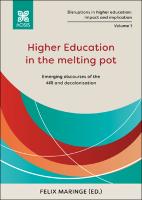Higher Education in the melting pot
Emerging discourses of the 4IR and decolonisation
Author(s)
Maringe, Felix
Ndofirepi, Amasa P.
Dlamini, Simon M.
Bayaga, Anass
Moyo, George
Kitching, Ansie E.
Collett, Karen S.
Damons, Lynne N.
Chiramba, Otilia F.
Ndofirepi, Elizabeth S.
van Wyk, Mari
Moodley, Kimera
Coetzee, Carla
Robberts, Ankie
Moll, Ian
Charamba, Erasmos
Ajani, Oluwatoyin A.
Uleanya, Chinaza
Olivier, Jako
Contributor(s)
Maringe, Felix (editor)
Language
EnglishAbstract
The idea of this book emerged from the Education Deans Forum (EDF) meeting held in Johannesburg in 2018. The forum discussed the twin issues of the 4IR and Decolonisation and how these were likely to impact the future development of Higher Education in South Africa. Essentially, this book provides scholarly analyses of a range of possible impacts of the two discourses. On one hand, the discourses are discussed as representing convergences and divergences in relation to their epistemological, ontological, axiological and methodological assumptions. On the other, they are portrayed as competing for dominance in the contemporary and future discourses in Higher Education. As a scholarly compilation of high-end research, the book is a must-read resource for academics generally and those in teacher education disciplines particularly. Issues of the automation of academic workspaces, impact of digital divides, the opportunities and constraints of the technologisation of curricula, pedagogies, teaching and learning and the intractable challenges of remote modalities of university instruction are dealt with by some of the leading thinkers in the South African academies.


 Download
Download Web Shop
Web Shop